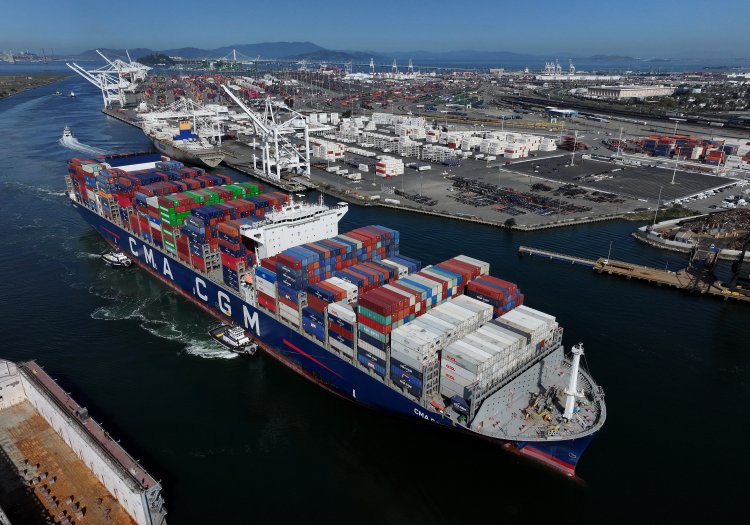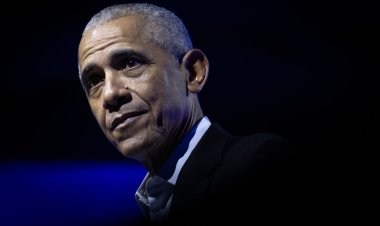Trump hits pause on trade war
Tariffs on China will increase to 125 percent, whereas other nations will receive a 90-day grace period.

This announcement followed a post where Trump urged the nation to “BE COOL” amidst ongoing worldwide turmoil, marked by pushback from China and the European Union, along with financial repercussions felt in bond markets.
As Trump paused his broader tariff initiatives amid growing fears of recession, he increased tariffs on China to 125 percent, citing “the lack of respect that China has shown to the World’s Markets.”
In response, Beijing announced additional tariffs on imports from the United States, culminating in a total of 84 percent, following the White House's hike of tariffs on all Chinese goods to 104 percent.
“When you punch at the United States of America, President Trump is going to punch back harder,” press secretary Karoline Leavitt told reporters outside the West Wing after Trump’s announcement. Just a day earlier, she had stated there were no plans to delay or reverse any of the tariffs.
Trump’s reversal—while maintaining a 10 percent reciprocal tariff on countries during the pause—helped the stock market rebound after several days of steep declines. Treasury Secretary Scott Bessent, who joined Leavitt in addressing reporters, revealed plans to engage with counterparts from Japan, Vietnam, and South Korea this week to discuss bilateral trade agreements.
“We saw the successful negotiating strategy President Trump implemented a week ago today and it has brought more than 75 countries forward to negotiate,” Bessent stated. “It took great courage for him to stay the course until this moment. And what we have ended up with here — as I told everyone a week ago [here] in this very — do not retaliate, and you will be rewarded. So every country in the world who wants to come and negotiate, we are willing to hear you.”
While Trump’s inner circle had contemplated a 90-day pause—an option hinted at by national economic advisor Kevin Hassett during an appearance on Fox News—the decision only solidified on Wednesday, triggered by China’s tariff escalations and ongoing market instability, as reported by a person close to the White House who spoke anonymously to disclose internal discussions.
The same source noted that Bessent played a vital role in persuading Trump to target China, suggesting that this would be a favorable position, while negotiating a pause on tariffs with other nations.
Addressing reporters, Bessent countered the narrative that Trump's decision to back down from the trade war, which had erased trillions in global market value in less than a week, was an acknowledgment of the resulting chaos.
“No, President Trump created maximum negotiating leverage for himself,” Bessent asserted, emphasizing that formal agreements to prevent the reimplementation of tariffs would “take some time.”
Bessent, who had traveled to Palm Beach the previous weekend to discuss the escalating trade war with Trump, mentioned that the financial markets failed to grasp that Trump’s tariffs were an initial strategic maneuver in a broader negotiation.
Commerce Secretary Howard Lutnick shared that he and Bessent were in the Oval Office when Trump crafted the post that announced the policy shift.
Though several officials and GOP lawmakers connected with the White House had a sense of impending changes, the specifics became clear only in the moment.
Sen. Ted Cruz, who had cautioned a day earlier about the dire consequences of a drawn-out trade war, conveyed that he had been in talks with the White House and Trump, advocating for a retreat from the confrontational stance.
“I am doing everything I can to urge the president to listen to the voices of the angels and not the devils,” Cruz remarked to reporters.
U.S. Trade Representative Jamieson Greer acknowledged to the House Ways and Means Committee that he was aware a pause on tariffs was being considered as he attended a hearing on Wednesday morning, but only learned of the final decision in real-time.
"I understand it's 90 days, I haven't spoken to the president since I've been in this hearing," Greer said.
Democrats, who have criticized the administration for its erratic policies, remained unimpressed.
"It looks like your boss just pulled the rug out from under you and paused the tariffs, the taxes on the American people. There is no strategy, you just found out three seconds ago, we saw you," declared Rep. Steven Horsford.
Until the president’s afternoon announcement, neither Trump’s assurances of brighter outcomes nor the contradictory reassurances from aides had managed to stabilize the markets. Instead, they seemed to heighten the uncertainty that drove trading indices into chaos and prompted international responses.
In recent days, industry CEOs and lobbyists have reached out to anyone capable of communicating with Trump, aiming to inform him about the potential economic damage stemming from an extended trade conflict.
During a Fox Business Channel interview earlier on Wednesday, JP Morgan Chase CEO Jamie Dimon warned that a recession was “a likely outcome” of Trump's trade war.
Coinciding with China’s announcement of counter-tariffs, EU member states voted to implement their own retaliatory tariffs against the U.S., set to go into effect on Tuesday as the bloc’s first countermeasure to Trump’s steel and aluminum tariffs.
Bessent asserted that Trump had “goaded” China into retaliating but omitted any explanation for why similar consequences weren’t directed at Europe’s response.
The EU’s retaliatory tariffs are expected to impact nearly €21 billion of U.S. products—spanning a range from soybeans to motorcycles and orange juice—and will be implemented in three stages.
Debra A Smith for TROIB News
Find more stories on Business, Economy and Finance in TROIB business












